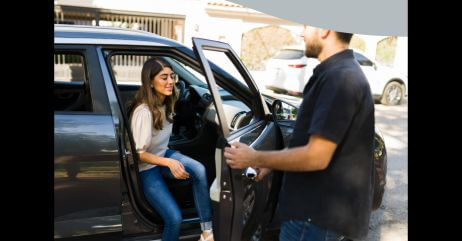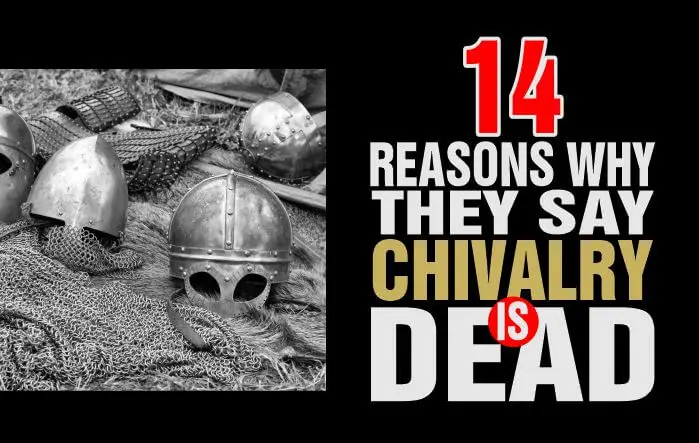Let’s talk about the belief that chivalry is dead, hinging on the societal changes and cultural shifts leading to the decline of traditional chivalric practices.
The phrase “chivalry is dead” can be heard in modern discourse, exposing a widespread belief that age-old concept of chivalry, a traditional code of conduct, especially in relationships and social behaviour has died and buried.
While tales of knights and courtly love have faded into the annals of history, the lingering echoes of chivalry’s demise persistently reverberate in contemporary conversations.
If chivalry is dead, why does the concept still work today? And if chivalry is not dead, why do men not take advantage of it?
After minimal research, we were able to find reasons why chivalry is perceived to be dead.
This article throws a bright light on the reasons why this belief holds sway, and the societal shifts that has helped in its enshrinement, including gender roles that are still evolving, cultural shifts and more.
You might want to read about the famous chivalry code of the Knights.
Table of Contents
- What Does the Statement “Chivalry is Dead” Mean?
- The Perception of Chivalry’s Decline in Modern Times
- Reasons Why People Believe Chivalry Is Dead
- Hope for the Revival of Chivalry
- Final Words from Gentsways
- Frequently Asked Questions About Chivalry
What Does the Statement “Chivalry is Dead” Mean?
The statement “chivalry is dead” mirrors a belief that traditional courteous behaviors, especially those expressed by men towards women, have been abandoned in modern society.
It means that acts of reverence like opening and holding doors, being a lady’s knight in shining amour are no longer in vogue as they are termed outdated.
Recommended: 15 Reasons Why Chivalry Might not be Dead
The Perception of Chivalry’s Decline in Modern Times
The perception of the death of chivalry in modern times is a complex and subjective topic.
Some argue that traditional codes of honor, respect, and courtesy have eroded in today’s society, leading to a decline in chivalrous behavior.
Others contend that chivalry has evolved to new forms of respect and equality.
The rise of individualism, changing gender roles, and the influence of technology are often cited as factors contributing to this perception.
Ultimately, the perception of the death of chivalry in modern times varies depending on one’s values, experiences, and cultural context.
Now let’s go deeper…
Reasons Why People Believe Chivalry Is Dead

Why this may or may not represent your opinion, these reasons are the result of the findings Gentsways made and are subject to debate.
We applied some of the principles of the medieval knights which are still applied today in everyday life, and we found that these concepts of chivalry work.
However, what raises the question is why they are not being applied as much. We hope you find the answer in the following subheadings.
1. Changing Gender Roles
Changing gender roles are often cited as a reason people believe chivalry is dead.
Shifting social norms have evolved from traditional views of men as sole protectors and providers to a more equal perspective, diminishing the practice of chivalrous behaviors.
Additionally, the feminist movement, while promoting gender equality, has led some to view chivalry as patronizing, undermining women’s independence and further questioning its relevance.
Related: How to be an All-round Gentleman

2. Influence of Technology and Digital Communication
Technology has reshaped interactions, making traditional chivalrous gestures less common.
Online dating encourages curated personas, reducing authenticity and sincerity, while the abundance of options encourages a disposable relationship mindset.
Additionally, reliance on digital communication diminishes meaningful face-to-face connections, leading to a decreased appreciation for chivalry and its personal touch.
This shift towards online interactions has its downsides for chivalry.
However, we found out that chivalry has taken another form online. Here is a post about internet chivalry.
Related: Before You Become a Gentleman
Related: The Charm and Elegance of Country Gentleman
3. Busy and Hectic Lifestyles
Another reason the belief that chivalry is dead festers is because modern life demands more time at work than leisure, leading to time constraints that negatively impact relationships.
Busy schedules make it difficult to balance personal and professional lives, resulting in a decreased emphasis on chivalry.
As individuals become more self-focused, they may overlook courteous acts, prioritizing personal goals over thoughtful interactions.
Related: Navigating Modern Society with Modern Chivalry

4. Fear of Misinterpretation or Offense
The fear of misinterpretation often leads to the belief that chivalry is dead as gestures like opening doors can be perceived as intrusive or implying incapacity.
Concerns about being seen as patronizing also contribute to this reluctance, as individuals worry their kindness might come off as condescending.
Additionally, the fear of criticism in an increasingly equality-focused society further discourages acts of goodwill and assistance.
5. Lack of Role Models and Mentorship in Chivalry
Role models are essential for teaching chivalrous behaviors. Without proper examples, younger generations find it difficult to understand chivalry.
The absence of mentorship negatively impacts their appreciation of chivalric values, as these behaviors are rarely practiced or emphasized in contemporary society, leading the belief that chivalry is dead.
6. Consumerism and Materialism
Consumerism and materialism contribute to the decline of chivalry by overshadowing personal values with a focus on material possessions.
In a consumer-driven society, the focus on acquiring luxury items diverts attention from traditional chivalric virtues like honor and respect.
Additionally, the commercialization of romantic gestures pushes individuals to express affection through material gifts rather than meaningful actions.
This emphasis on grand displays of chivalry for social validation can conflict with authentic intentions, leading to a perception that genuine chivalry is obsolete as individuals prioritize external appearances over true values.
7. Negative Media Portrayals
Negative media portrayals contribute to the belief that chivalry is dead by shaping cultural attitudes and perpetuating misconceptions.
Media often depicts men and chivalry as outdated or harmful, leading to the perception that chivalrous acts are no longer valued.
Stereotypes suggest that such behaviors are patronizing rather than respectful, discouraging both men and women from practicing or expecting chivalry.
Additionally, distorted representations in television, movies, and advertisements reinforce the idea that chivalry is unnecessary, causing individuals to hesitate in exhibiting or appreciating these behaviors, further solidifying the belief that chivalry is obsolete.
8. Fear of Rejection or Ridicule
Fear of rejection and vulnerability contributes to the belief that chivalry is dead as individuals hesitate to display kindness and respect due to past negative experiences.
Overcoming this fear requires acknowledging insecurities, recognizing vulnerability as strength, and building self-confidence through self-reflection and self-improvement to revive chivalrous behaviors.
9. Lack of Reciprocity and Gratitude
The lack of reciprocation for chivalrous gestures contributes to the belief that chivalry is dead.
Acts like holding doors or offering to pay often go unappreciated, leading to a perception that such kindness is overlooked.
Mutual respect and gratitude are essential for sustaining chivalry; without them, individuals may feel discouraged from continuing these behaviors.
Promoting a culture of appreciation through education and communication can help revive the value of chivalry.
10. Focus on Instant Gratification
The focus on instant gratification contributes to the perception that chivalry is dead, as it discourages acts of courtesy and consideration for others.
In a fast-paced, technology-driven society, individuals prioritize immediate satisfaction over the needs of others, leading to impatience and a reluctance to engage in chivalrous behaviors that require time and effort.
11. Fear of Chivalry Being Misconstrued as Weakness
Fear of chivalry being perceived as weakness contributes to the belief that it is dead. Traditionally linked to masculinity, chivalry reflected qualities like courage and honor.
However, evolving societal norms challenge these perceptions, leading to concerns that chivalrous acts may now be seen as weak or subservient.
12. Influence of Past Generations
Chivalry has evolved significantly from medieval times to today. Modern society’s emphasis on gender equality and shifting cultural values have rendered some traditional chivalric acts outdated or patronizing.
Family upbringing plays a crucial role in shaping perceptions of chivalry, with respect and kindness remaining relevant values, even as other aspects fade.
13. Fear of Being Misjudged or Labelled
Acts of chivalry are often misunderstood and labeled negatively, which deters people from practicing them.
Misinterpretations and concerns about being seen as outdated or sexist can discourage chivalrous behavior.
Despite these challenges, embracing chivalry authentically, and focusing on genuine respect and care, remains important in navigating evolving societal norms.
14. Rise of Individualism
The decline of chivalry is also linked to the rise of individualism, as people prioritize personal freedom and self-expression over communal norms.
This shift has diminished the sense of obligation and duty that once supported chivalric behavior, leading to a more self-centered approach to relationships and social interactions.
Hope for the Revival of Chivalry
The revival of chivalry remains uncertain, but acts of kindness and genuine interest in others persist.
While chivalry originated in medieval times, its principles of honor, loyalty, and selflessness have endured throughout history, evident in the bravery of soldiers and civil rights activists.
Reviving chivalry requires promoting kindness, respect, and integrity through education and personal commitment.
Embracing chivalric values today involves treating others with respect and empathy, encouraging a more equitable and compassionate society for everyone.
Final Words from Gentsways
While it is often claimed that chivalry is dead, the reality may be more nuanced.
The reasons for this perception are certainly valid, including changing societal norms, gender equality, and the rise of individualism.
However, it is important to acknowledge that chivalry may not be completely extinct.
There are still individuals who uphold traditional acts of kindness, courtesy, and respect towards others.
It is up to society as a whole to redefine chivalry, allowing it to evolve into a more inclusive and respectful form.
So instead of proclaiming its demise, perhaps we should strive to revive and adapt chivalry to the modern world, promoting a more compassionate and genuine society.
Frequently Asked Questions About Chivalry
What is chivalry and is it dead?
Chivalry, originally a medieval code emphasizing honor and respect, has evolved in modern times. While some see it as obsolete due to changing norms, others recognize its continued presence in acts of kindness.
Is chivalry dead in modern-day society?
Chivalry may be perceived as less prevalent in modern-day society due to changing gender roles and societal norms. However, acts of kindness, respect, and courtesy still exist, indicating that while it may have evolved, chivalry is not entirely dead.
What does chivalry mean today?
Today, chivalry involves values of respect, kindness, and integrity, promoting equality and inclusivity. It emphasizes acting with courtesy and compassion towards others, regardless of gender.
What is chivalry to a woman?
Chivalry to a woman involves courteous, respectful behavior, kindness, and protection. It means treating her with dignity, honor, and fairness while valuing her individuality and worth.
Citations:
- https://www.regain.us/advice/general/why-chivalry-is-dead-and-what-it-means-for-romance/
- https://eu.fsunews.com/story/opinion/2021/11/07/chivalry-didnt-die-killed/6330116001/
- https://www.spectator.co.uk/article/is-it-offensive-for-men-to-offer-women-a-seat-on-the-tube/
Pyo Merez is a men’s lifestyle enthusiast and writer about the gentleman’s place and impact on society. Raised by a distinguished gentleman dad, he offers unique insights into how the mind of a gentleman works and how societal norms shape gentlemen’s identity and vice versa.
Through his insightful articles, Pyo taps into the depths of gentleman culture to provide perspectives on etiquette and manners in modern society.

